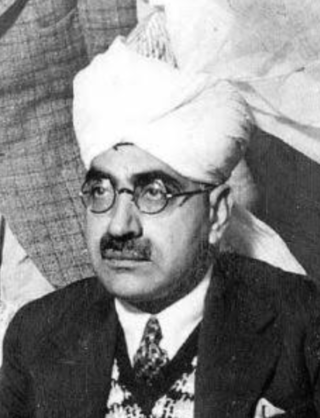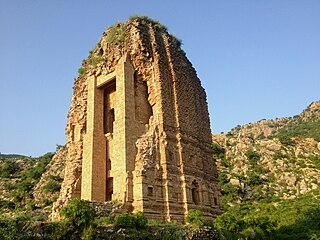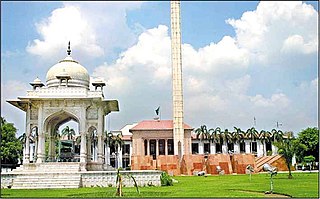Related Research Articles

Sir Malik Khizar Hayat TiwanaKCSI, OBE (Punjabi: ملک خضرحیات ٹوانہ;, was an Indian statesman, landowner, army officer, and politician belonging to the Punjab Unionist Party. He served as the prime minister of the Punjab Province of British India between 1942 and 1947. He opposed the Partition of India and the ideology of Muslim League. He was eventually ousted from office by the Muslim League through a civil disobedience campaign, plunging Punjab into communal violence that led to the partition of the province between India and Pakistan.

Khan Bahadur Major Sir Sikandar Hayat Khan,, also written Sikandar Hyat-Khan or Sikandar Hyat Khan, was an Indian politician and statesman from the Punjab who served as the Premier of the Punjab, among other positions.

Khushab District, is a district in the province of Punjab, Pakistan, with its administrative capital in Jauharabad. The district is named after the historical city of Khushab located within its boundaries. According to the 1998 census, the population was 905,711, with 24.76% living in urban areas.
The National Unionist Party was a political party based in the Punjab Province during the period of British rule in India. The Unionist Party mainly represented the interests of the landed gentry and landlords of Punjab, which included Muslims, Hindus and Sikhs. The Unionists dominated the political scene in Punjab from World War I to the independence of India and the creation Pakistan after the partition of the province in 1947. The party's leaders served as Prime Minister of the Punjab. The creed of the Unionist Party emphasized: "Dominion Status and a United Democratic federal constitution for India as a whole".

Major Shaukat Hayat Khan was an influential politician, military officer, and Pakistan Movement activist who played a major role in the organising of the Muslim League in the British-controlled Punjab.
Roda is a village (Thal) and one of the 51 Union Councils of Khushab District in the Punjab Province of Pakistan. It is located at 32°4'26N 72°5'60E, southwest of Khushab city.
Shahpur District was a district in what is now Pakistan from 1893, during the British Raj, till 1960. From 1893 to 1914 Shahpur was the district headquarters. In 1914 the district headquarters were moved from Shahpur to Sargodha, although the district continued to be known as Shahpur. In 1960 the Sargodha District was created and Shahpur District became Shahpur Tehsil.
Raja Ghazanfar Ali Khan Khokhar was an Indian politician and monarch. He was born in Pind Dadan Khan, a town in Jhelum district, British India. He was a leading member of the All India Muslim League and a trusted lieutenant of Muhammad Ali Jinnah, serving in the Interim Government of India of 1946 as a member of the Central Legislative Assembly of India.
Khan Sahib, Qazi Zafar Hussain came from a qadi's family which had, since the 16th century, been prominent among the landed aristocracy of the Soon Valley. He belonged to Awans tribe of ancient repute. He was awarded the title of Khan Sahib by the British Crown. This was a formal title, a compound of khan (leader) and sahib (Lord), which was conferred in Mughal Empire and British India. Although his father, Qazi Mian Muhammad Amjad forbade his descendants to establish Dargah, he was considered Sajjada Nashin by the people of his area. "Sajjada nashins" David Gilmartin asserts, "claimed to be the descendants of the Sufi, 'saints', intermediaries between the Faithful and their God, and this cut against the grain of Islamic orthodoxy ... in kind, of their special religious status, these sajjada nashins had become men of local standing in their own right." However he never claimed to be a Sajjada Nashin. In the Punjab, the sajjada nashin or pir families were not so rich in terms of land as the great land lords of Punjab but these sajjada nashin or pir families exerted great political and religious influence over the people. The British could not administer the area without their help and no political party could win the election without their help.

When the All-India Muslim League was founded at Dacca, on 30 December 1906 at the occasion of the annual All India Muhammadan Educational Conference, It was participated by the Muslim leaders from Punjab, i.e., Sir Mian Muhammad Shafi, Mian Fazl-i-Hussain, Abdul Aziz, Khawaja Yusuf Shah and Sh. Ghulam Sadiq. Earlier Mian Muhammad Shafi organised a Muslim Association in early 1906, but when the All-India Muslim League was formed, he established its powerful branch in the Punjab of which he became the general secretary. Shah Din was elected as its first president. This branch, organised in November 1907, was known as the Punjab Provincial Muslim League.
Qazi Mazhar Qayyum 'Raees-Azam Naushera', is a Pakistani politician. He came from a qadi's family that had been prominent among the landed aristocracy of the Soon Valley since the 16th century.
Umerpura Chak No.50 R/B ਟਿਵਾਨਾ, ٹوانہ Tiwana is a village in Shahkot tehsil, Nankana Sahib District, Punjab, Pakistan. It is 1.5 kilometres (0.9 mi) from Shahkot on the road to Sangla Hill. It has a primary school and a girls' middle school.

Jhawarian is a town located near the Jhelum River in the District Sargodha, Tehsil Shahpur, Punjab, Pakistan.
Behak Mekan is a small town located in the of Punjab, Pakistan. It was established during the British Empire era. The town is situated 16.5 kilometres (10.3 mi) from the city of Sargodha and 10 kilometres (6.2 mi) away from Dhreema. Due to its strategic location, the British Royal Air Force constructed an airstrip near "godhay wala" which became later significant to the Pakistan Air Force after the independence of Pakistan.
Khakh is surname belonging to the Jat clan. Most of those with the name are followers of Sikhism and Islam, but a large number of Sikhs also exist among those identifying with the name. Just like many other Jatt castes, the Khakh originate in the historical Punjab region of South Asia. Today, the surname is widely popular across Indian Punjab, New Delhi and Pakistani Punjab.
Malik Khuda Buksh Tiwana is a political leader from Hassanpur Tiwana, Khushab District of Punjab, Pakistan.
Malik Sahib Khan TiwanaCSI was a Punjabi Muslim Jatt landowner during the British India.
Malik Fateh Khan Tiwana was a Punjabi landowner, Sardar of Mitha Tiwana State and politician during the Sikh Empire.
The Tiwana family of Shahpur is a Punjabi Muslim feudal family part of the Tiwana Punjabi clan of Jats elite.

Malik Muhammad Waris Kallu, also known by the name of Waris Shad, was a Pakistani politician from Khushab District. who was a Member of the Provincial Assembly of the Punjab, from 2002 to 12 March 2021.
References
- ↑ Amjad Mahmood (21 December 2020). "Sargodha's citrus claim to fame". Dawn (newspaper). Retrieved 26 February 2023.
With a population of around 4.9m in the district, Jatt is the major tribe whose sub-clans like Noons, Ranjhas, Pirachas, Cheemas, Gondals, Midhianas, Chatthas, Tiwanas and Luks are mostly engaged with farming.
- ↑ Lamba, Puneet Singh (15 February 2003). "BiographiesKhushwant Singh: "Japji Sahib is Based on the Upanishads"". The Sikh Times. Retrieved 25 July 2023.
- ↑ Ian Talbot (2013). Khizr Tiwana, the Punjab Unionist Party and the Partition of India. Taylor & Francis. pp. 13–14. ISBN 978-1-136-79036-2.
- ↑ "Profile of Malik Khizr Hayat Khan Tiwana". Story of Pakistan website. Archived from the original on 30 October 2018. Retrieved 26 February 2023.
- ↑ Jinnah, M.A.; Wavell, A.P.W.E.; Garewal, S.M. (1986). Jinnah-Wavell Correspondence, 1943-47. Publication (Research Society of Pakistan). Research Society of Pakistan, University of the Punjab. Retrieved 25 July 2023.
Khizr Hayat Khan, b. August 7, 1900; belonged to Tiwana (Jat) family of Sargodha
- ↑ "Politics of the region (read about Malik Khuda Buksh Tiwana under this title)". District Government Khushab website. Archived from the original on 8 January 2014. Retrieved 27 February 2023.